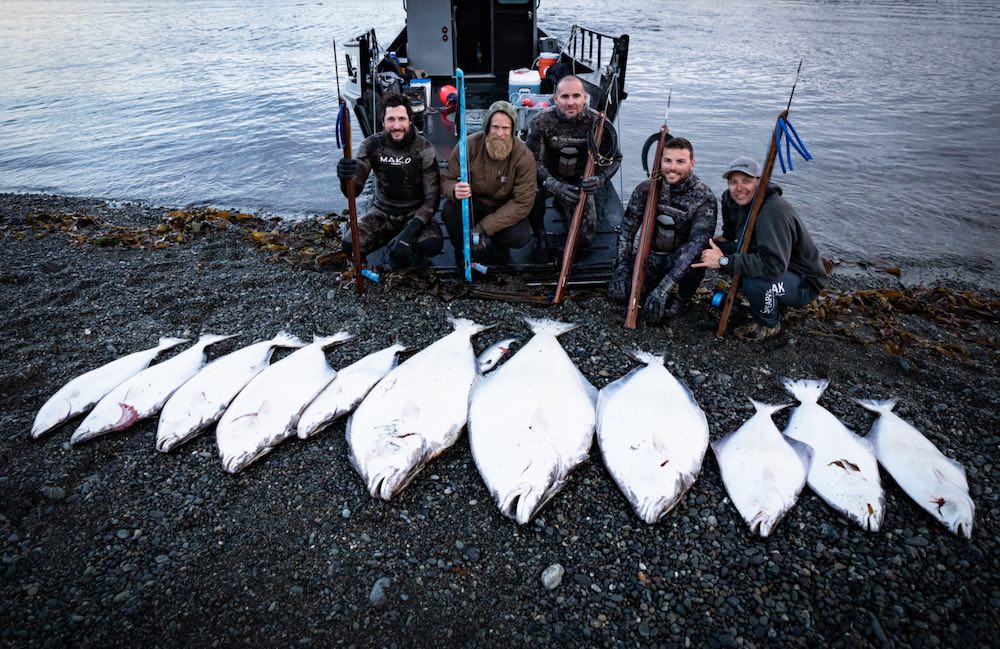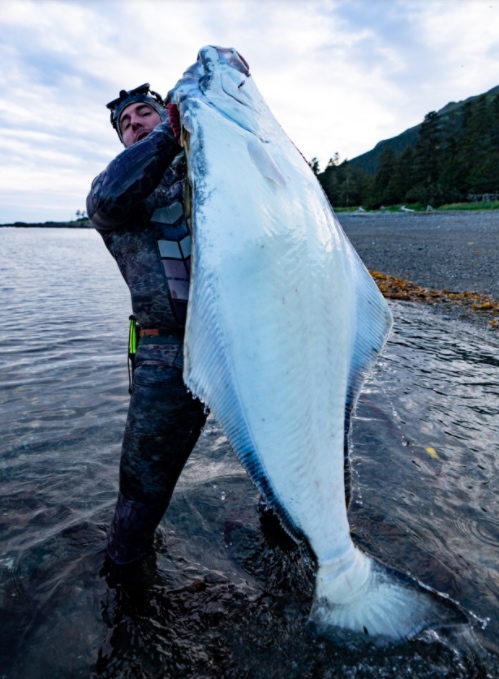The line between hunter and hunted has always been blurry at best in the 49th state. Every year people get mauled by brown bears, harassed by black bears, encircled by wolves, or stomped by moose. Turns out even the fish are willing to go on the offensive.
On Aug. 21, Chris Pollack and four friends ran a boat from their homes in Seldovia and Homer around to the rugged southwest coast of the Kenai Peninsula that faces the Gulf of Alaska to free dive in a system of bull kelp forests. Though anglers usually target large halibut in depths beyond 300 feet, occasionally the massive flatfish will migrate into extreme shallows to feed or breed. Pollack and his friends didn’t dive past 40 feet that day.
 Image via Rafael de la Uz.
Image via Rafael de la Uz.
“We got into this spot thick in the kelp and on one of the first drops a buddy picked up a 95-pounder,” Pollack told MeatEater. “We're like, ‘Wow, this spot is hot.’ We stayed down there most of the day and made a bunch of drops and Brad ended up pulling up a 110- or 115-pounder.”
The spearfishing stayed good all day despite challenging conditions with strong current and sea swell. In the afternoon, Pollack took a deep breath and sunk below the surf of the North Pacific.
“I made the drop and I'm just sitting on the bottom and I hadn't even been down there that long,” he said. “And then all of a sudden that halibut just cruised right in on me and it snapped at my flopper.”
Pollack guessed that the 60-pound halibut mistook the flashing metal “flopper” tab on his spearpoint for one of the sandlance baitfish that were prevalent in the area. A flopper basically serves as a barb, passing through the fish with the spear tip then opening to keep the catch from sliding off.
“I went to shoot him and he was too close for my gun,” he said. “So I'm sitting there and I'm trying to back up my arm to try to get a shot off and you can kind of see at the end of the video, I turned my gun and I stabbed him from the top.”
The halibut went limp.
“He went flat and he almost like quivered a little bit. I'm like, OK, he's stoned, I'm just gonna kick up. I thought he was dead,” Pollack said. “So, I start kicking to the surface and I was just so stoked, man. But in the back of my mind, I was like, ‘OK, I should probably pull the trigger and shoot the spear through there and get on the shooting line just in case.’ I got close to the surface and he woke up and just exploded and ripped off my shaft and he was gone.”
Ironically, the flopper that attracted the fish didn’t penetrate completely and thus failed to deploy. Pollack said that this kind of erratic behavior is common with big halibut hit with a spear or harpoon: they’ll play possum only to come back to life with a vengeance. He was sad to lose the fish but expected it would survive. He and his friends harvested 11 halibut that day anyway.
Free-dive spearfishing (without oxygen from Scuba tanks or rebreathers) is a relatively new and exciting pursuit in a state already rich in outdoors opportunities. Participants require 7-mm wetsuits, heavy weight belts, healthy lungs, and a lot of grit to dive Alaskan waters that rarely exceed 50 degrees, but the rewards are clearly impressive. Pollack and his wife recently opened Alaska Free Diver, the state’s second spearfishing gear shop, out of their home in Seldovia.
 Image via Brian Reid.
Image via Brian Reid.
Pollack’s friend and fellow diver that day, Brad Conley, pictured, operates a water taxi and spearfishing charter out of Homer called Coldwater Alaska. The small group of friends started free diving for halibut about 10 years ago, he said, but the whole world found out about it when one of their captains, John Dornellas, shot the 149-pound spearfishing world record halibut in 2019. This summer, coldwater captain Brian Ried guided a spearfisherwoman to the biggest halibut ever taken with a pole spear.
“We’d been surfing up here for years so we already had the wetsuits,” Conley told MeatEater. “So, we thought it would be fun to try and spear one of those big halibut. After the first time getting towed around by a big fish I was hooked. It’s pretty surreal to be in the water wrestling a fish bigger than you.”
The all-tackle world record world record Pacific halibut was caught near Dutch Harbor, Alaska, in 1996 and weighed 459 pounds. If one of these crazy free-diving Alaskans were to encounter such a fish with their spearguns, we’d suggest steering clear and staying alive. Who knows if they’d listen.




